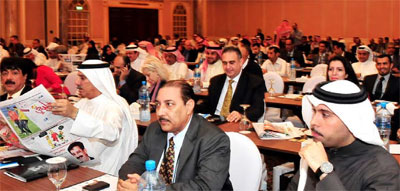
Adapting to change 'vital for managers'
Manama, January 9, 2013
The need to adapt to change is what leaders and managers, whether in China or the US, Bahrain or Japan must be able to achieve if they wish to bring about an improvement in the way they do business and raise the standards of living of their citizens, said a top official.
There is no improvement without change, although there can be change without improvement. For organisations, it is a matter of survival to respond effectively to change, Minister of State for Electricity and Water Affairs Dr Abdulhussain Mirza, was quoted as saying in the Gulf Daily News, our sister publication.
He was speaking at the opening session of the first GCC Leadership Conference at the Diplomat Radisson Blu Hotel, Residence and Spa yesterday, which took as its theme 'Secrets of Change Management'.
"Change is the only constant the Greek philosopher Heraclitus said some 2,600 years ago," the minister said.
"This quote, or variations of it, have endured centuries and are as valid today as when they were first pronounced. Changes caused by evolving organisational structures or work environments affect millions in the world's workforce," he noted.
"Mergers as well as industrial consolidations are prime examples. Particularly we have seen this trend in three industries, banking, aviation and electronics, where consolidations have dramatically changed the number of players," said Dr Mirza.
"But dramatic changes can also occur due to events that are not planned and cannot be predicted or controlled, most notably natural disasters," he added.
"But nature is not the only causative factor that introduces change and the way we operate. Human nature can play as an important role as nature itself," he remarked.
"The banking scandals are credited to be among the fundamental causes for the currently on-going economic crises facing the developed economies. Recently scandals in the media have also joined the ranks of industries that face more scrutiny and control," he said.
"One common thread that joins the above ideas is that whatever type of change one might encounter, if not addressed and managed well, it can lead to negative results and undesirable situations," he added.
"Isaac Asimov, the renowned American author and professor of biochemistry, best known for his works of science fiction, once said that it is change, continuing change, inevitable change, that is the dominant factor in society today. No sensible decision can be made any longer without taking into account not only the world as it is, but also the world as it will be," said Dr Mirza.
"This, in turn, means that our statesmen, our businessmen, our everyman must take on a science fictional way of thinking.
"It is at this junction that the concept change management needs a better definition and interpretation and I hope that this conference will do that," he said.
"As we speak, the world in general and our region in particular are witnessing dramatic life-changing events," he added.
"The global business environment is also becoming more challenging, displaying a shift in the balance of power evidenced by growth in emerging markets co-existing with recession and decline in Europe.
"Our own region has undergone significant changes on the political, social, economic, religious and democratic scenes.
"Economic changes worldwide have had their impacts on the GCC countries and these effects are expected to continue.
"The concept of change management gained growing importance over the past few decades as an important skill that leaders of nations or businesses, or other decision-makers, must possess to steward the organisation in the current and, more importantly, in the future environments.
"Change management is a process aimed at facilitating the concept of change and enabling stakeholders to accept and embrace changes in their business environment," the minister said.
"Experts describe the process as an undertaking to shifting transitioning individuals, teams, and organisations from a current state to a desired future state," he added.-TradeArabia News Service







